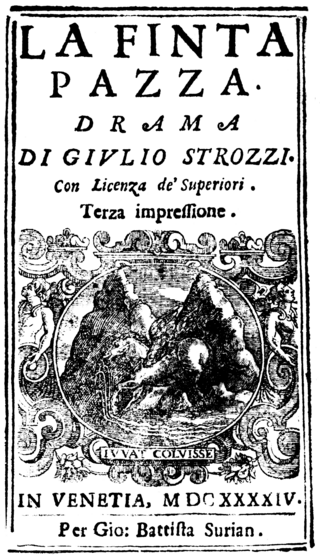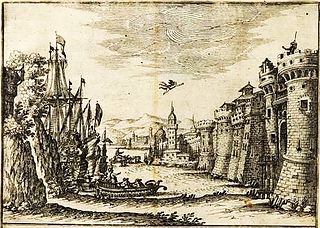
Pope Clement IX, born Giulio Rospigliosi, was head of the Catholic Church and ruler of the Papal States from 20 June 1667 to his death in December 1669.

Belisario (Belisarius) is a tragedia lirica in three acts by Gaetano Donizetti. Salvadore Cammarano wrote the Italian libretto after Luigi Marchionni's adaptation of Eduard von Schenk's play, Belisarius, first staged in Munich in 1820 and then in Naples in 1826. The plot is loosely based on the life of the famous general Belisarius of the 6th century Byzantine Empire.

Un ballo in maschera is an 1859 opera in three acts by Giuseppe Verdi. The text, by Antonio Somma, was based on Eugène Scribe's libretto for Daniel Auber's 1833 five act opera, Gustave III, ou Le bal masqué.

Giulio Cesare in Egitto ; pronounced[ˈdʒuːljoˈtʃeːzareineˈdʒitto,-ˈtʃɛː-]; HWV 17), commonly known as Giulio Cesare, is a dramma per musica in three acts composed by George Frideric Handel for the Royal Academy of Music in 1724. The libretto was written by Nicola Francesco Haym who used an earlier libretto by Giacomo Francesco Bussani, which had been set to music by Antonio Sartorio (1676). The opera was a success at its first performances, was frequently revived by Handel in his subsequent opera seasons and is now one of the most often performed Baroque operas.

Roberto Devereux is a tragedia lirica, or tragic opera, by Gaetano Donizetti. Salvadore Cammarano wrote the Italian libretto after François Ancelot's tragedy Elisabeth d'Angleterre (1829), and based as well on the Historie secrète des amours d'Elisabeth et du comte d'Essex (1787) by Jacques Lescène des Maisons. Devereux was the subject of at least two other French plays, both titled Le Comte d'Essex: one by Thomas Corneille and one by Gauthier de Costes, seigneur de la Calprenède.

Il ritorno d'Ulisse in patria is an opera consisting of a prologue and five acts, set by Claudio Monteverdi to a libretto by Giacomo Badoaro. The opera was first performed at the Teatro Santi Giovanni e Paolo in Venice during the 1639–1640 carnival season. The story, taken from the second half of Homer's Odyssey, tells how constancy and virtue are ultimately rewarded, treachery and deception overcome. After his long journey home from the Trojan Wars Ulisse, king of Ithaca, finally returns to his kingdom where he finds that a trio of villainous suitors are importuning his faithful queen, Penelope. With the assistance of the gods, his son Telemaco and a staunch friend Eumete, Ulisse vanquishes the suitors and recovers his kingdom.

Tarquinio Merula was an Italian composer, organist, and violinist of the early Baroque era. Although mainly active in Cremona, stylistically he was a member of the Venetian school. He was one of the most progressive Italian composers of the early 17th century, especially in applying newly developed techniques to sacred music.

The First Italian War, sometimes referred to as the Italian War of 1494 or Charles VIII's Italian War, was the opening phase of the Italian Wars. The war pitted Charles VIII of France, who had initial Milanese aid, against the Holy Roman Empire, Spain and an alliance of Italian powers led by Pope Alexander VI, known as the League of Venice.

Elvida is a melodramma or opera in one act by Gaetano Donizetti. Giovanni Schmidt wrote the Italian libretto. The opera was written as a pièce d'occasion for the birthday of Queen Maria of the Two Sicilies. The choice of subject matter was no doubt intended as an elegant acknowledgement of the Queen's Spanish ancestry. Donizetti received little financial reward for the work and, as a result, put the minimum of effort into its composition.

The House of Cybo, Cibo or Cibei of Italy was the name of an old and influential aristocratic family from Genoa of Greek origin that ruled the Duchy of Massa and Carrara.

Le duc d'Albe or Il duca d'Alba is an opera in three acts originally composed by Gaetano Donizetti in 1839 to a French language libretto by Eugène Scribe and Charles Duveyrier. Its title, which translates as The Duke of Alba, refers to its protagonist Fernando Álvarez de Toledo, 3rd Duke of Alba. The work was intended for performance at the Paris Opéra. However, William Ashbrook notes that "Rosine Stoltz, the director's mistress, disliked her intended role of Hélène and Donizetti put the work aside when it was half completed".

Maometto II is an 1820 opera in two acts by Gioachino Rossini to an Italian libretto by Cesare della Valle. Set in the 1470s during a time of war between the Turks and Venetians, the work was commissioned by the Teatro di San Carlo in Naples. Della Valle based his libretto on his earlier play Anna Erizo. The name of the title character, Maometto II, refers to the real-life Ottoman Sultan and conqueror of Constantinople Mehmed II, who lived from 1432 to 1481.

Alfonso Michele Litta was an Italian nobleman who was a Cardinal and Archbishop of Milan from 1652 to 1679.
Andrea Salvadori was an Italian poet and librettist. He was born in Florence and educated at the Collegio Romano in Rome. From 1616 until his death in Florence at the age of 43, he was the principal court poet to the Medici family. In addition to numerous theatrical entertainments and poems, he wrote the libretti for five operas, four of which have survived, although only La Flora composed by Marco da Gagliano and Jacopo Peri has an extant score. He was married twice, first to Emilia Rigogli by whom he had three sons and then to the painter Alessandra Furini. A collection of Salvadori's principal works curated by his son Francesco was published in 1668.

The Italian composer Claudio Monteverdi (1567–1643), in addition to a large output of church music and madrigals, wrote prolifically for the stage. His theatrical works were written between 1604 and 1643 and included operas, of which three—L'Orfeo (1607), Il ritorno d'Ulisse in patria (1640) and L'incoronazione di Poppea (1643)—have survived with their music and librettos intact. In the case of the other seven operas, the music has disappeared almost entirely, although some of the librettos exist. The loss of these works, written during a critical period of early opera history, has been much regretted by commentators and musicologists.

Ennio Fantastichini was an Italian actor.

La finta pazza is an opera composed by Francesco Sacrati to a libretto by Giulio Strozzi. Its premiere in Venice during the Carnival season of 1641 inaugurated the Teatro Novissimo. It became one of the most popular operas of the seventeenth century.

L'Argia is an opera in a prologue and three acts composed by Antonio Cesti to a libretto by Giovanni Filippo Apolloni. It was first performed in the court theatre at Innsbruck on 4 November 1655 to celebrate the visit of Queen Christina of Sweden who was on her way to exile in Rome. Over the next 20 years it had multiple performances in Italian cities including Venice and Siena where it inaugurated Siena's new opera house in 1669. Its first performance in modern times took place at the Innsbruck Festival of Early Music in 1996. Set on the Island of Cyprus in ancient times the opera's convoluted plot, full of disguises and mistaken identities, revolves around the amorous misadventures of Selino who has been pursued to Salamis by his deserted wife Princess Argia.
Giovanni Filippo Apolloni was an Italian poet and librettist. Born in Arezzo, he has sometimes been referred to as "Giovanni Apollonio Apolloni", but the second given name is spurious. He served as the court poet to Ferdinand Charles, Archduke of Austria at Innsbruck form 1653 until 1659. On his return to Italy he entered the service of Cardinal Volumnio Bandinelli. After Bandinelli's death in 1667 Appolloni was in the service of the Chigi family in Rome and Siena for the rest of his life. He wrote the librettos for a number of operas, the most well-known of which were Antonio Cesti's L'Argia and La Dori, as well as several oratorios and the texts for cantatas by both Cesti and Alessandro Stradella.
Giuseppe Balducci was an Italian composer, primarily of operas. Born in Iesi, he spent most of his career in Naples and was one of the originators of the "salon opera" genre, the forerunner of chamber opera.


















